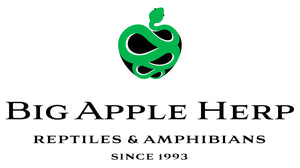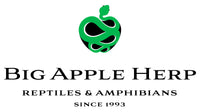Care Sheet For Tegus
Tegus are a hardy lizard that can grow up to 40” and live more than 15 years in captivity. Tegus are believed to be one of the most intelligent of the large reptiles kept in captivity. It is common for them to become docile with regular human interaction and to form a bond with their keepers. The genus of Tegus contains a variety of species. For this reason, it is difficult to provide a single Care Sheet for all species and subspecies of Tegus. This Care Sheet provides a basic outline of how to keep your Tegu happy and healthy, with some species specific information noted. At Big Apple Pet Supply, we carry only Captive Bred Tegus to maintain strict quality control.
Housing
Tegus require a large secure enclosure which includes enough space to freely turn, move around, climb, perch, dig and hide. Young Tegus can start in a 36”L x 24”W x 20”H, but will soon need to be moved to a larger enclosure – at least double that size. Depending on the temperatures in your area, you may be able to house your Tegus in a large outdoor enclosure some or all of the year. Or you may use some combination of indoor and outdoor enclosures. Tegus are social and can be housed together, but make sure their enclosure allows plenty of space for each. Tegus are also known to be “domesticated” and may roam freely in their keeper’s home. If you choose to allow your Tegus to roam freely, make sure they are receiving the proper humidity and UV or sun light.
Substrate
Tegus need substrate deep enough for digging and excavating. Cypress mulch, such as Zoo Med's Forest Floor Bedding, or coconut fiber, such as Zoo Med Eco Earth Coconut Fiber, are good choices.
Heating
Tegus require a temperature gradient between 80° Fahrenheit (cool side) to 90° F (warm side), with a basking area of 95° F (no more than 100°). Big Apple's Black Heat Infrared Ceramic Heat Emitters and incandescent lights, such as the Zoo Med Basking Spot Bulbs are ideal. We recommend controlling the ceramic emitter with a thermostat, such as the BAH-500 or BAH-1000DC, and monitoring the temperatures with a thermometer.
Lighting
Tegus require 10 to 12 hours of UV light or unfiltered sunlight daily. We highly recommend SunForce UV Mercury Vapor Bulbs. NOTE: You must change your UV bulbs every 6 months in order to maintain proper UVA/UVB.
Shelter
Provide a variety of large hides where your Tegu can conceal its body and turn around freely while inside. Hide boxes should include moistened substrate to add to the humidity of the enclosure.
Shedding
Tegus require a moist environment of 75% to 90% humidity. Provide a large hide box with moistened substrate, a container large enough for soaking the whole body, and daily misting. Tegus may immerse their entire body in water to facilitate shedding so provide a container large enough that your Tegu can soak its entire body but not so big that it might have a difficult time getting in or out of the container.
Water
Provide a large, heavy bowl of fresh water daily. The bowl should be large enough for your Tegu to fully soak its entire body. The water dish should be placed on the cooler side of the enclosure.
Food
Tegus are omnivorous and enjoy a varied diet but most pet Tegus have a diet heavy on animal matter with smaller portions of fruits or vegetables. Pinkie mice, raw meat, boiled eggs, and fruits are common foods for Tegus. Ready-to-Use foods such as Zoo Menu Tegu & Monitor Food, are also popular and readily available. Note that Red Tegus eat more fruit and other plant matter than most types of Tegus. Never leave uneaten food in your Tegu’s enclosure.
Vitamins
Frozen rodents and commercially made foods do not have to be dusted with supplements. However, a calcium/Vitamin D supplement, such as Zoo Med Repti Calcium with D3 or Rep-Cal Calcium, should be sprinkled on raw meat or fruits. A multi-vitamin supplement, such as Herptivite, should be provided once or twice a week.
Cage Maintenance
Remove uneaten foods and soiled substrate daily. Provide clean drinking water daily. Thoroughly clean the habitat and cage furnishings regularly with Quat TB Pet Area Cleaner, Deodorizer & Stain Remover or a mild detergent.


